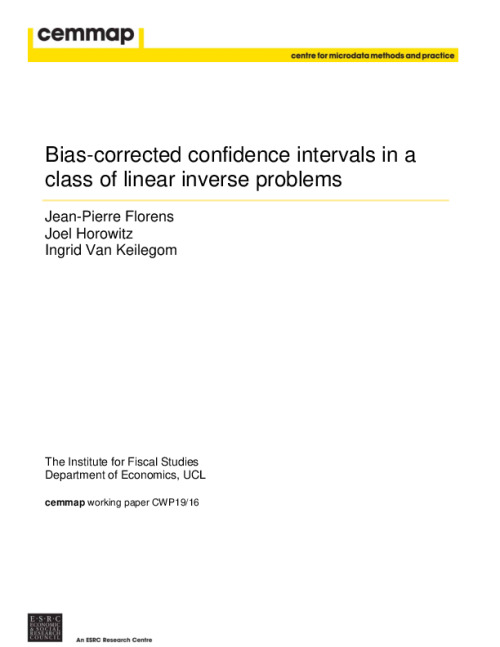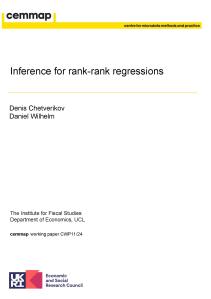Downloads

cwp191616.pdf
PDF | 371.13 KB
In this paper we propose a novel method to construct confi dence intervals in a class of linear inverse problems. First, point estimators are obtained via a spectral cut-off method depending on a regularisation parameter, that determines the bias of the estimator. Next, the proposed con fidence interval corrects for this bias by explicitly estimating it based on a second regularisation parameter ρ, which is asymptotically smaller than α. The coverage error of the interval is shown to converge to zero. The proposed method is illustrated via two simulation studies, one in the context of functional linear regression, and the second one in the context of instrumental regression.
Authors
Working Paper details
- DOI
- 10.1920/wp.cem.2016.1916
- Publisher
- IFS
Suggested citation
J, Florens and J, Horowitz and I, van Keilegom. (2016). Bias-corrected confidence intervals in a class of linear inverse problems. London: IFS. Available at: https://ifs.org.uk/publications/bias-corrected-confidence-intervals-class-linear-inverse-problems (accessed: 30 June 2024).
More from IFS
Understand this issue

Gender norms, violence and adolescent girls’ trajectories: Evidence from India
24 October 2022

What are the challenges in getting debt on a falling path?
28 June 2024

Election Special: Your questions answered
27 June 2024
Policy analysis

IFS Deputy Director Carl Emmerson appointed to the UK Statistics Authority Methodological Assurance Review Panel
14 April 2023

ABC of SV: Limited Information Likelihood Inference in Stochastic Volatility Jump-Diffusion Models
We develop novel methods for estimation and filtering of continuous-time models with stochastic volatility and jumps using so-called Approximate Bayesian Compu- tation which build likelihoods based on limited information.
12 August 2014

Is there really an NHS productivity crisis?
17 November 2023
Academic research

Inference for rank-rank regressions
28 May 2024

Sample composition and representativeness on Understanding Society
2 February 2024

The impact of labour demand shocks when occupational labour supplies are heterogeneous
28 June 2024
